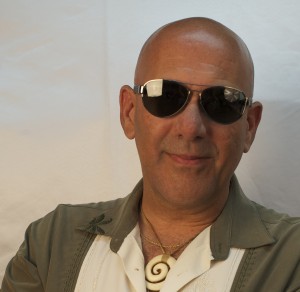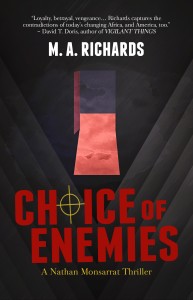Fellow International Thriller Writers member M.A. Richards joins me here to celebrate this BLOG’S BIRTHDAY. He shares a story about a birthday that he is unlikely to ever forget. He also shares an excerpt from his debut novel CHOICE OF ENEMIES.
BAGHDAD BIRTHDAY BLUES
By M.A. Richards
In my debut novel, CHOICE OF ENEMIES (Sunbury Press 2016), a birthday conversation takes place at Greylock College in the Berkshires of western Massachusetts between the protagonist, Nathan Monsarrat, and the antagonist, Felix Sanhedrin:
Sanhedrin slipped the receipt into his shirt pocket. “The tip cost more than the lunch.”
“It’s the price of doing business, but you can surely afford it.”
“How can you be so certain, old buddy?”
“Because I’m about to make you very wealthy,” Monsarrat answered.
“In that case, consider today’s lunch as your birthday present, slightly belated.”
“Very good of you to remember.”
“The big four-oh, right? A great year. Life begins at forty.”
“As long as it doesn’t end before forty-one,” he replied.
I experienced my own “fin-de-birthday” in Baghdad.
I curtailed my assignment at the U.S. Embassy in Seoul to served in Baghdad from 2007-2008, 366 days of unmitigated nastiness. Halfway through the tour, my birthday arrived…there was nothing celebratory about Baghdad, other than going wheels up at BIAP and flying back home, so I postponed the party until after I deployed from Iraq for good. On the big day, instead of blowing out candles, I slung on my PPE (body armor and helmet), rolled outta my hooch ( a 12×9 foot thin-skin trailer), and moved as quickly as possible from one bumblebee yellow Duck’n’Cover cement rocket shelter to the next until I reached the DFAC (central dining facility).
The convoy of up-armored HUMVEEs waited in front of the DFAC, three muscular vehicles, each with refractive armor, ballistic windows, and a serious Ma Deuce machine gun protruding from the roof. The time was 0700. The temperature was somewhere north of 110 degrees. The Team Leader, a Bureau of Diplomatic Security protection officer who had served multiple tours with the Marines in Fallujah and Ramadi, offered the Baghdad Catechism, a standardized list of do’s and do not’s provided before each mission launched beyond the walls of the Green Zone: do not power on your cell phone inside the vehicle; do keep your helmet securely fastened while inside the vehicle; do not attempt to open the doors – they will be opened for you once the perimeter is secured.
The final instructions of the Team Leader addressed the advent of an attack: do hunker down on the floor of the HUMVEE; do not raise your head until given the all clear. No one offered instructions on how to respond if the all clear never arrived. No one wanted to poke Fate. No one ever explained what to do when Fate poked you. Forty-five minutes after we mounted up and rolled out, Fate shoved us very hard.
Our mission: cross the Tigris River for a tête-à-tête with the Minister of Oil to devise a strategy to stop the theft of oil products from the Taji refinery by AQIM, Al-Qaeda in Mesopotamia, activities that enriched the terrorist organization and allowed it to fund operations against U.S. and Coalition forces. We never made it to the meeting. A team of insurgents was spotted by our air assets burying IEDs inside mounds of garbage on the side of the road, at the exact point where the tarmac had cratered, narrowing the approach to the bare width of a HUMVEE.
We were two hundred meters from the site when the Team Leader turned us around. The convoy began to reverse direction, according to procedure, when the insurgent spotter in an apartment building triggered the IEDs. The air assets and the Ma Deuces opened up. I remember the concussive force rocking the HUMVEEs, the noise of the big machine guns, the stench of sweat and cordite and burning garbage. I remember sending a prayer of thanks toward heaven, and I remember my relief when the convoy again crossed the Tigris River and approached the first checkpoint at the outermost entrance to the Green Zone.
The convoy stopped beneath the rotunda of the Republican Palace, a building of Babylonian proportions with stone walls three feet thick. It offered the façade of safety – much more so than my thin-skin trailer. I spent the remainder of the day in my office inside the Palace, and I slept at my desk that night, feeling like a kid secure in the cocoon of the stone walls.
But on that burning Iraqi morning, I received my most valuable birthday gift ever: another day to live and love. I stopped taking people for granted. I began to appreciate the rhythms and the music that linked the minutes of each day and made each day, and each person, special. I learned patience – toward others and toward myself. I also made a vow, to pursue my dream of writing books, becoming an author, creating new worlds, providing pleasure through words. It took eight years to realize that promise, and when CHOICE OF ENEMIES launched in January 2016, I again sent a prayer of thanks toward heaven…and looked forward to my next birthday.
 During a career as a Cultural Attaché in the Department of State that spanned more than two decades, M. A. Richards served in Baghdad, Jerusalem, Lagos, Moscow, Seoul, Tel Aviv, and Washington, D.C. He also served at U.S. Pacific Command in Honolulu as the Special Advisor to the Commander. He speaks Arabic, Hebrew, Korean, and Russian. Visit www.marichardsbooks.com to learn more about M. A. Richards and Choice of Enemies.
During a career as a Cultural Attaché in the Department of State that spanned more than two decades, M. A. Richards served in Baghdad, Jerusalem, Lagos, Moscow, Seoul, Tel Aviv, and Washington, D.C. He also served at U.S. Pacific Command in Honolulu as the Special Advisor to the Commander. He speaks Arabic, Hebrew, Korean, and Russian. Visit www.marichardsbooks.com to learn more about M. A. Richards and Choice of Enemies.
Connect with M.A. Richards on his WEBSITE, FACEBOOK, TWITTER, AMAZON and GOODREADS.
 CHOICE OF ENEMIES by M.A. Richards
CHOICE OF ENEMIES by M.A. Richards
As the price for each barrel of oil rises and the stakes for securing the black gold increase, American oil companies and the CIA plot to secure the flow of the crude in Africa.
Nathan Monsarrat, a retired CIA deep cover operative, is visited by his Agency mentor, who offers him a choice: launch the coup d’état or condemn the woman who saved his life to a brutal execution.
In Africa, he discovers the Agency plans to reward his services with an oil soaked grave, but assisted by a coterie of new and old allies, he parries the Agency, circumvents the consortium, and exacts his own vengeance.
In doing so, he learns that his choice of friends is as important as his choice of enemies.
Excerpt from CHOICE OF ENEMIES
IN THE COOL OF THE AFRICAN DAWN
In the cool of the African dawn, six armored Suburbans bulled through the sodden Delta jungle toward Bonny Island. In their wake, whirlwinds of red dirt billowed upward toward the crown canopy. Inside the vehicles, frigid air filtered the jungle stench of rot and decay. Felix Sanhedrin, a twenty-five-year veteran of covert operations in Africa and the Middle East, sat on the rear bench of the convoy’s second Suburban like Allan Quatermain returned to the Dark Continent. White linen slacks, a blue Oxford shirt, a silk ascot, and a freshly pressed, khaki bush jacket adorned his thin frame. A device more computer than chronometer rested on his left wrist. His felt slouch hat boasted a faux leopard-skin band, and his canvas jungle boots gleamed. A Glock 19 nested in a leather holster on his right hip.
Sanhedrin’s new boots rested atop two green, canvas duffel bags stuffed with Benjamin Franklins, and he carried with him, like a talisman, the blessings of the Mandarins who guided the operations of the Central Intelligence Agency in Langley, Virginia. Despite their stated policy to never negotiate with the enemies of the United States, Sanhedrin had convinced the éminences grises to ransom his assistant, Nathan Monsarrat, from the rebel group called Fighters Against Terror in Africa, or FATA.
He issued orders like a young boy presenting Santa Claus with his Christmas list. “First rule: I’m in charge, and my word is law. Second rule: we take only Monsarrat with us. Final rule: my money’s bought your silence. Neither you nor your shooters nor your medics will speak of this mission to anyone. Never repeat, never. Capish, my new friend?”
Next to Sanhedrin, Mark Palmer wore funereal black, a shooter’s vest, tee shirt, tactical pants, jungle boots, baseball cap, Nomex gloves, and sunglasses. Years beneath the African sun had braised his face and arms. He was clean shaven, and his hair was cut in a brown bristle. Military tattoos covered both his forearms, and blue veins latticed his knotted muscles. He carried an M4 rifle, a brace of Heckler and Koch P30 pistols in nylon holsters strapped to his thighs, a combat knife, commo gear, and four P30 magazines looped onto his belt. The shooter’s vest held extra M4 mags.
He spoke with a soft, Southern drawl. “Five by five, Mr. Scarnagh. No worries. We were never here.”





